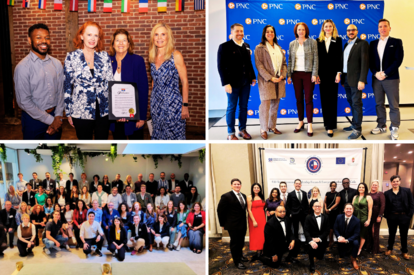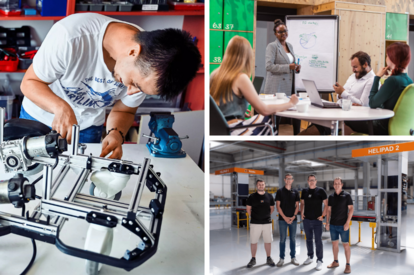
Embedding sustainability into your daily business operations is not only beneficial for the environment, but can also improve your brand reputation, reduce costs, and attract socially conscious customers. In this article, we’re sharing 5 strategies that will help your business become more sustainable.
Sustainability is a must-have for any successful business. While the concept of sustainability can take on various meanings depending on the context, at its core, it involves protecting our environment, addressing climate change, and using resources strategically. In this article, we’ll explore 5 practical strategies to help small and medium-sized enterprises (SMEs) integrate sustainability into their business plans.
What is sustainability and why does it matter for SMEs?
Sustainability, often linked primarily to environmental concerns, is a multifaceted concept including 3 key dimensions:
- Environmental sustainability revolves around safeguarding the planet’s health for current and future generations. For example, this involves reducing greenhouse gas emissions, preserving natural resources, and conserving biodiversity.
- Economic sustainability is about running a profitable business while adhering to responsible practices. It entails ensuring that economic activities contribute to societal growth, promoting resource responsibility, minimising waste, and creating value not only for shareholders, but also for customers, employees, and the broader community.
- Social sustainability means focusing on building fair and inclusive societies, supporting communities, and upholding ethical standards.
Small companies are well-positioned to influence and drive sustainability efforts. In Europe, they account for over 99 percent of all businesses and employ approximately 100 million people. SMEs are deeply intertwined with their communities, which allows them to be agile in responding to market demands and sustainability trends.
Moreover, businesses that prioritise social sustainability tend to outperform their competitors, building strong reputations, attracting top talent, and resonating with ethically conscious consumers. By embracing all aspects of sustainability, small businesses can shape a better future for themselves and the communities they serve.
5 things small businesses can do to become more sustainable
Here are 5 hands-on strategies that your small business can adopt to boost its sustainability:
1. Conduct a sustainability assessment
Your journey towards sustainability begins with a comprehensive assessment of your current environmental impact. Analyse your business operations and identify areas where you can reduce your environmental footprint. This may include energy consumption, waste generation, water usage, and supply chain practices. If you’re uncertain about how to conduct this assessment, consider bringing in a sustainability expert or reaching out to Enterprise Europe Network which offers sustainability services to entrepreneurs.
2. Set clear sustainability goals
Setting clear sustainability goals is essential for guiding your small business’s efforts and measuring progress. Identify sustainability priorities relevant to your industry, business size, and values. For example, aim to reduce energy consumption, minimise waste, source from sustainable suppliers, or support local communities. Ensure these goals are specific, measurable, achievable, relevant, and time-bound (SMART) for optimal results.
3. Engage and educate your team
A sustainable business is a team effort. Involve your staff and make them champions of your sustainability mission. Educate them on the importance of sustainability and how their daily actions contribute to the company’s overarching goals. Encourage them to share ideas for sustainable practices and consistently acknowledge and reward their contributions.
4. Implement sustainable practices
With your goals in place and your team on board, it’s time to put sustainable practices into action. Here are some steps you can take:
- Upgrade lighting, heating, and cooling systems for better energy efficiency. Encourage employees to turn off lights, computers, and equipment when not in use.
- Embrace the three Rs: reduce, reuse, and recycle, while minimising single-use plastics and exploring composting options.
- Choose suppliers who prioritise sustainability and ethical practices; consider sourcing locally to reduce transportation emissions.
- Communicate your sustainability efforts in marketing materials and product labelling. Share your progress with customers and fans to build a strong and supportive community.
5. Track and report progress
Regularly monitor and measure your progress to stay aligned with your sustainability goals. Share this information with stakeholders, including customers and investors, to foster trust and credibility. By communicating the positive impact you’re making through your sustainability efforts, you’ll strengthen your brand’s reputation and loyalty. Keep in mind that sustainability is an ongoing journey and results may take time.
How Enterprise Europe Network can help
With over 15 years of experience, the Network has supported thousands of SMEs in their sustainability efforts. Empower, an Icelandic start-up building diverse, equitable, and inclusive workplaces, received over 2 million Euro in investment with the Network’s support, expanding from a team of 3 to 14 in just 2 years. Another example is AlongRoute. This Greek company uses AI to create ultra-precise marine forecasts for cleaner oceans. The Network helped them access funding, showcase their products at industry and networking events such as the Web Summit in Lisbon, and find new business partners.
Nature Compound is another young start-up addressing environmental challenges. Based in Germany, the small business develops bio-based alternatives to plastics. The company used the Circular Economy Audit tool developed by ZENIT, one of the Network’s partners, which helped the company secure a 4.8 million Euro investment for a modern production facility. Yet it’s not just plastic waste that’s causing pollution in our oceans and landfills. With the Network’s guidance, Pepper Valley is determined to change the face of the textile industry through smart fabrics and fair-labour practices.
Wondering how the Network can help your business become more sustainable, too? Our sustainability business support services include:
- Sustainability assessment and benchmarking. The Network assists small businesses in assessing their current sustainability practices. This involves comparing their sustainability performance with that of similar companies within their sector. Each SME gets a customised report that offers insights into its current position in the sustainability landscape.
- Personalised support. The Network’s business advisers work closely with SMEs, diving deep into their unique needs and challenges. By understanding the specific context of each business, they provide tailored advice and recommendations for making daily operations more sustainable.
- Sustainability partners. One of the key strengths of Enterprise Europe Network is its vast and well-connected ecosystem. SMEs seeking sustainable solutions can tap into this network to find the right business partners, access green technologies, and explore new markets.
- Subject matter expertise. The Enterprise Europe Network is a valuable source of knowledge on various sustainability topics, including sustainable business models, clean technologies, energy and resource efficiency, waste and water management, sustainable finance, and EU certification schemes and legislations.
- Technical knowledge. Sustainability spans a wide range of technical aspects. To address these specialised needs, the Network collaborates with local support organisations and experts who focus on specific sustainability domains. When small businesses require in-depth expertise, the Network can seamlessly connect them with these specialists, ensuring that they receive the guidance they need.
Sustainability is a practical and essential component of business success. By embedding sustainability into your SME’s operations, you can benefit the environment, enhance your brand reputation, reduce costs, and attract conscious consumers. Reach out today to your local Network contact point to take the first step towards a more sustainable business.
Katrín Jónsdóttir is a Senior Adviser at the International Division of the Icelandic Centre for Research (Rannis). She is also a Project Manager and Task Leader for communication for Enterprise Europe Network. Katrin holds a MSc degree in International Business and Marketing from Reykjavik University.
Related articles

In a world of saturated markets and shrinking attention spans, innovative SMEs must go beyond great products: they need smart, strategic communication to succeed globally. Discover five powerful tips...

Starting a business on a tight budget? You don’t need a huge marketing budget to see real results. In this article, we’ll share 4 affordable marketing strategies for small businesses, showing you how...

Is Texas your next big opportunity? You’re probably thinking of sizzling fajitas, rugged cowboys, or the sweet sound of Willie Nelson strumming his guitar. Well, Texas has all of that, but it’s also...

Start-ups need funding, mentorship, and networks to scale. Big companies are looking for fresh ideas, disruptive tech, and faster ways to stay ahead. When they join forces, both sides win. Keep...
